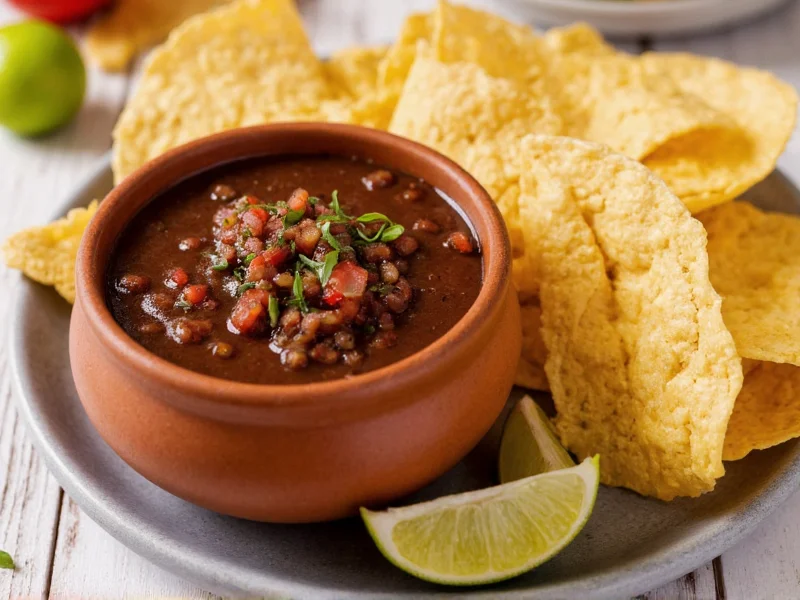What Exactly Is Chocolate Salsa?
Chocolate salsa represents a creative fusion of traditional Mexican salsa concepts with sweet dessert elements. While conventional salsa relies on tomatoes, onions, and peppers, chocolate salsa transforms this concept into a sweet treat by incorporating melted chocolate, fresh or dried fruits, and complementary spices. The "salsa" in the name refers to the chunky, dip-like consistency rather than any savory tomato base.
This innovative dessert dip gained popularity in the United States during the late 20th century as chefs experimented with sweet applications of traditional Mexican cooking techniques. Unlike its savory counterpart, chocolate salsa serves as a versatile dessert component that can range from mildly sweet to richly decadent depending on the chocolate quality and additional ingredients.
Essential Ingredients for Authentic Chocolate Salsa
Creating perfect chocolate salsa requires careful ingredient selection. The foundation consists of:
- High-quality chocolate - Dark chocolate (60-70% cacao) provides the best flavor balance
- Fresh fruit - Strawberries, bananas, or mangoes add natural sweetness and texture
- Complementary spices - Cinnamon is essential, with optional additions like chili powder or cayenne
- Liquid component - Heavy cream, coconut milk, or fruit juice for proper consistency
- Sweetener - Only if needed, as quality chocolate and ripe fruit often provide sufficient sweetness
| Ingredient | Recommended Amount | Substitution Options |
|---|---|---|
| Dark chocolate | 8 ounces | Semi-sweet chocolate or cacao nibs |
| Fresh strawberries | 1 cup diced | Mango, banana, or dried cranberries |
| Heavy cream | 1/4 cup | Coconut milk or almond milk |
| Cinnamon | 1/2 teaspoon | Vanilla extract or nutmeg |
| Chili powder | 1/8 teaspoon | Cayenne pepper (pinch) |
Classic Chocolate Salsa Recipe
This tested recipe yields approximately 2 cups of chocolate salsa with the perfect balance of sweet and complex flavors:
Ingredients
- 8 ounces high-quality dark chocolate, finely chopped
- 1 cup fresh strawberries, diced
- 1/4 cup heavy cream
- 1/2 teaspoon ground cinnamon
- 1/8 teaspoon chili powder (optional)
- 1 tablespoon orange zest
- 1 teaspoon vanilla extract
Step-by-Step Instructions
- Place chopped chocolate in a heatproof bowl
- Heat cream until just simmering, then pour over chocolate
- Let sit for 2 minutes, then stir until smooth (this is your chocolate base)
- Mix in cinnamon, chili powder (if using), orange zest, and vanilla
- Gently fold in diced strawberries
- Cool to room temperature, then refrigerate for 1 hour before serving
Serving Suggestions for Chocolate Salsa
Understanding how to serve chocolate salsa properly enhances the experience. This versatile dessert component works well with:
- Sweet dippers - Graham crackers, cinnamon sugar tortilla chips, or shortbread cookies
- Fresh fruit - Apple slices, banana chunks, or pineapple spears
- Breakfast applications - As a topping for pancakes, waffles, or French toast
- Dessert enhancement - Drizzled over ice cream or cheesecake
- Cocktail pairing - Complements dessert wines or spiced rum drinks
Popular Variations of Chocolate Salsa
Once you've mastered the basic recipe, these creative variations can expand your chocolate salsa repertoire:
Spicy Chipotle Chocolate Salsa
Replace the cinnamon with 1/4 teaspoon chipotle powder and add 1 tablespoon of honey for a sweet-heat profile that balances the smokiness. This variation works particularly well with mango instead of strawberries.
White Chocolate Raspberry Salsa
Substitute dark chocolate with white chocolate and use fresh raspberries instead of strawberries. Add 1 tablespoon of lemon juice to brighten the flavor profile. This version creates a visually striking pink salsa perfect for special occasions.
Healthy Avocado Chocolate Salsa
For a nutrient-dense option, blend 1 ripe avocado with 4 ounces melted dark chocolate, 1 tablespoon cocoa powder, and 2 tablespoons of maple syrup. This version maintains the dip consistency while adding healthy fats and reducing sugar content.
Storage and Shelf Life Guidelines
Proper storage ensures your chocolate salsa maintains optimal texture and flavor:
- Refrigerate in an airtight container for up to 5 days
- Do not freeze, as the fruit texture will degrade upon thawing
- Stir well before serving if separation occurs
- Bring to room temperature for 15 minutes before serving for best consistency
- Discard if mold appears or if it develops an off smell
Common Mistakes to Avoid When Making Chocolate Salsa
Even experienced cooks can encounter issues with chocolate salsa. Watch for these common pitfalls:
- Overheating the chocolate - Causes seizing; always use gentle heat
- Using unripe fruit - Creates an unpleasant tartness that overwhelms the chocolate
- Adding liquid ingredients while chocolate is hot - Can cause separation
- Over-mixing the fruit - Creates a mushy texture rather than the desired chunky salsa consistency
- Skipping the resting period - Proper chilling allows flavors to meld and texture to set
Why Chocolate Salsa Works as a Dessert Concept
The success of chocolate salsa as a dessert option stems from several culinary principles. The combination of sweet chocolate with fresh fruit creates a balance of flavors that satisfies without being overly rich. The chunky texture provides sensory interest that smooth chocolate sauces often lack. Additionally, the versatility of chocolate salsa makes it suitable for various occasions from casual gatherings to elegant dinner parties.
From a food science perspective, the fat content in chocolate helps carry flavor compounds from the spices and fruit, creating a more complex taste experience than simple chocolate dipping sauces. The acidity from fresh fruit also cuts through the richness of the chocolate, preventing palate fatigue.











 浙公网安备
33010002000092号
浙公网安备
33010002000092号 浙B2-20120091-4
浙B2-20120091-4